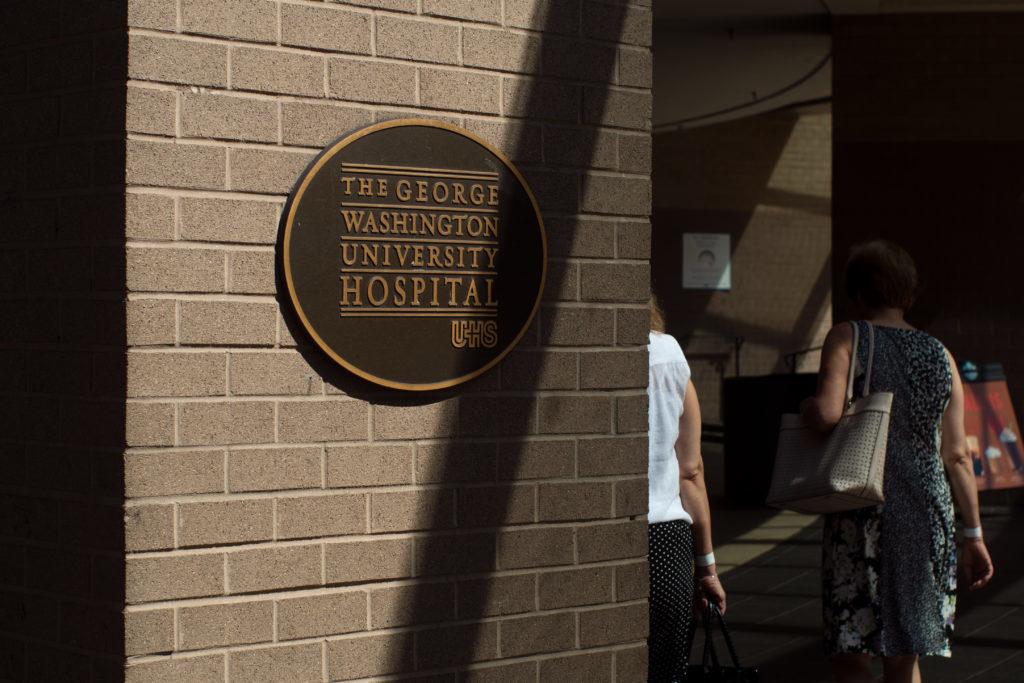Updated: Dec. 17, 2019 at 9:13 a.m.
GW is suing Universal Health Services, the Delaware-based majority owner of the GW Hospital, claiming the organization did not uphold its commitment to fund educational medical programs at the hospital.
In a 48-page lawsuit GW filed with the Medical Faculty Associates in the D.C. Superior Court Friday, the University alleges that UHS failed to uphold its agreement to create and expand hospital programs, like an ambulatory care network and centers that focus on issues like emergency medicine and women’s health. GW is asking for $100 million to account for the funds the UHS allegedly kept from the hospital as operating margins, claiming the money should have been used to support educational programs at the MFA and School of Medicine and Health Sciences.
“The partnership should have used these funds to advance the academic programs and research and teaching missions of the University and MFA, rather than to pad the already well-lined pockets of UHS and billionaire defendant Alan Miller,” the complaint states.
Data included in the lawsuit indicates that the hospital generates about a 13.5 percent operating margin, about five to six times more than “many” U.S. academic medical centers, because UHS has retained funds that would be used for research or education at the hospital.
“The true reason for its bloated margins is that DHP has reduced its costs, in part by withholding resources and failing to sufficiently support the academic missions of MFA and the University,” the complaint states.
The University partnered with UHS in the 1990s to form the joint venture District Hospital Partners, which operates as the GW Hospital, the complaint states. Officials intended to partner with a non-profit health care organization that would “enthusiastically” share GW’s educational mission to run the hospital, but UHS – a for-profit company – was the only entity interested in the partnership, according to the complaint.
The complaint states that UHS failed to fulfill several of the goals of the agreement, including its commitment to create “centers of emphasis” at the hospital that would focus on medical issues like cardiovascular disease and cancer treatment.
The complaint leaves plans to construct a hospital east of the Anacostia River, for which GW retained a lobbyist, in flux. Officials have expressed frustration with its agreement with UHS and a desire to renegotiate the entities’ terms in June.
GW claims that University President Thomas LeBlanc and former Board of Trustees Director Nelson Carbonell met with UHS and DHP officials multiple times to negotiate the terms of the agreement, but the parties could not reach a consensus.
University spokeswoman Crystal Nosal said the lawsuit is the University’s “last resort” after attempting to come to a new agreement with UHS.
“For too long, UHS has failed to support the mandates of our agreement and neglected investments in primary care, research and teaching and the development of a healthcare network that aligns with the missions of the medical school and MFA,” Nosal said in an email.
MFA spokeswoman Barbara Porter deferred comment to the University.
Margaret Warner, the legal counsel for UHS, said in a statement that UHS disputes GW’s claims and that UHS has fulfilled its financial responsibilities to the hospital since the agreement was formed.
“This lawsuit is nothing more than an attempt by the new leadership of the University to renegotiate – via litigation – agreements it entered into more than 20 years ago,” she said.
She said UHS “stepped in” to partner with GW when the University was in “dire financial straits” and invested millions of dollars into the hospital.
“UHS regrets that GWU’s new leadership has elected to file an unfounded lawsuit, to the substantial expense and distraction of all involved, rather than attempt to resolve its business concerns through good faith discussions,” Warner said.
Miller, the chairman and CEO of UHS and a defendant in the complaint, did not return a request for comment.
Defendant Matthew Klein, the UHS senior vice president and a UHSDC director, did not return a request for comment. Marvin Pember, a UHSDC director, the executive vice president and president of the acute care division at UHS and a defendant in the case, did not return a request for comment.
Cheryl Ramagano, a director of UHSDC, the senior vice president and treasurer of UHS and a defendant in the complaint, could not be reached for comment. Steve Filton, the executive vice president, chief financial officer and secretary of UHS and a defendant in the case, did not return a request for comment.
Marc Miller, the president of UHS and the son of Alan Miller, did not return a request for comment.
GW Hospital spokeswoman Susan Griffiths did not return a request for comments from defendants Kimberly Russo, the CEO of the hospital, and George Sprinkel, the hospital’s CFO.
The case is slated for an initial scheduling conference March 6, according to the D.C. Superior Court website.
Zach Schonfeld contributed reporting.
This post has been updated to reflect the following clarification:
This post has been updated to clarify a sentence regarding the University’s decision to hire a lobbyist for the construction of the hospital east of the Anacostia River.





